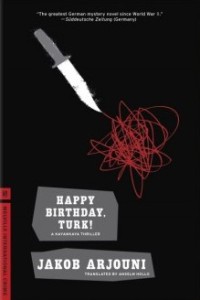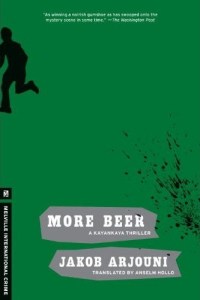Happy Birthday, Turk! by Jakob Arjouni
 Sunday, April 15, 2012 at 9:43AM
Sunday, April 15, 2012 at 9:43AM 
First published in German in 1987; published in translation by Melville House on February 15, 2011
The Ergün family is troubled. Vasif Ergün emigrated to Germany from Turkey and worked as a garbage collector before he became involved with some shady characters. After his death, his son-in-law, Ahmed Hamul, followed in Vasif’s questionable footsteps. Vasif’s wife is the backbone of the family. Vasif's son Yilmaz is bitter that his father preferred the company of Hamul. Vasif’s daughter Ayse has problems of her own, problems that other family members try to hide.
Now Hamul has been stabbed to death, his corpse unceremoniously dumped behind a brother. The police aren’t excited about the death of a Turk, so Hamul’s widow, Ilter, turns to private investigator Kemal Kayankaya to find her husband’s killers. Kayankaya’s investigation is hampered by uncooperative family members, unhelpful police officers, and sinister figures who threaten his welfare.
Happy Birthday, Turk!, the first of Jakob Arjouni’s Kayankaya novels, is a fine example of German noir. Kayankaya is a hard-drinking, easily angered outcast, an orphaned Turk who, although raised as a German citizen, endures the daily bigotry of Germans who don’t like his dark skin and non-Aryan features. Kayankaya’s intelligence and biting wit do nothing to ingratiate him with his fellow Germans -- not that he tries to win friends. More often, he tries to win fights with his powerful fists.
The plot of Happy Birthday, Turk! is tight and filled with twists that are interesting if not entirely surprising. The pace is swift. I admire writers of crime fiction who don’t waste words. Arjouni captures people and locations (and food) in a few perfect sentences. A waiter: “He reminded me of a gay hippopotamus.” A living room: “All it needed was an open drain, and the place could have been cleaned with a garden hose.” Arjouni isn’t Raymond Chandler, but he has his own distinctive style. Happy Birthday, Turk! isn’t my favorite Kayankaya novel, but it is a strong start to an excellent (if short-lived) series.
RECOMMENDED

